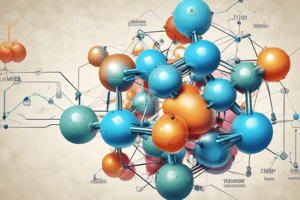Podcast
Questions and Answers
What is the study of chemistry primarily concerned with?
What is the study of chemistry primarily concerned with?
- Behavior of animals
- Composition of matter (correct)
- Properties of light
- Structure of buildings
Which of the following is defined as the smallest particle of an element that can combine with others to form compounds?
Which of the following is defined as the smallest particle of an element that can combine with others to form compounds?
- Atom (correct)
- Neutron
- Proton
- Molecule
What holds atoms together in a molecule?
What holds atoms together in a molecule?
- Gravity (correct)
- Metallic bonds
- Covalent bonds
- Ionic bonds
What are characteristics of a substance that can be observed without changing it called?
What are characteristics of a substance that can be observed without changing it called?
Which process involves two or more chemicals combining or separating into different substances?
Which process involves two or more chemicals combining or separating into different substances?
What does molecular structure refer to in chemistry?
What does molecular structure refer to in chemistry?
What branch of chemistry is primarily concerned with the relationship between heat and energy changes during a chemical reaction?
What branch of chemistry is primarily concerned with the relationship between heat and energy changes during a chemical reaction?
Which branch of chemistry focuses on the rates of chemical reactions?
Which branch of chemistry focuses on the rates of chemical reactions?
What is the main difference between organic chemistry and inorganic chemistry?
What is the main difference between organic chemistry and inorganic chemistry?
Which subfield of chemistry involves techniques for identifying and quantifying different types of matter?
Which subfield of chemistry involves techniques for identifying and quantifying different types of matter?
What does physical chemistry primarily explore?
What does physical chemistry primarily explore?
In what areas does chemistry have practical applications?
In what areas does chemistry have practical applications?
Flashcards are hidden until you start studying
Study Notes
Science: An Overview of Chemistry
Chemistry is one of the most fundamental sciences, exploring the composition, structure, properties, and behavior of matter through chemical reactions. It's the study of all types of matter and how they interact with each other, including physical transformations and processes such as synthesis, identification, analysis, and purification. At its core, chemistry involves understanding how atoms bond together to form molecules and compounds, leading to a wide range of materials we see around us.
Key Concepts and Principles
The foundation of chemistry lies in several key concepts and principles:
- Atoms: The smallest particle of an element, which can combine chemically with other atoms to form compounds.
- Molecular Structure: The arrangement of atoms within a compound or molecule.
- Bonding: The force that holds atoms together in a molecule. This can be ionic, covalent, or metallic bonding, depending on the type of substance.
- Reactions: A process where two or more chemicals combine or separate into different substances. These reactions may involve transfer of electrons, formation or breaking of bonds, and changes in temperature or pressure.
- Properties: Characteristics of a substance that can be observed without changing it. Examples include color, odor, hardness, and melting point.
- Quantum Theory: A principle that explains the behavior of particles at atomic scales, used to understand phenomena like electron orbitals and the periodic table.
- Kinetics: The branch of chemistry concerned with the rates of chemical reactions.
- Thermodynamics: The branch of chemistry that studies the relationship between heat and energy changes during a chemical reaction.
Types of Chemistry
Chemistry is broadly divided into two main branches: organic chemistry, which deals with carbon compounds, and inorganic chemistry, which covers all other elements. Organic chemistry, named after its origin from living organisms, plays an important role in our understanding of life processes, while inorganic chemistry has applications in materials science, industry, and environmental issues.
Other subfields within chemistry include physical chemistry, analytical chemistry, biochemistry, and polymer chemistry, each focusing on specific aspects or applications of the subject. For example, physical chemistry explores the interactions between particles using principles from physics, while analytical chemistry involves techniques for identifying and quantifying different types of matter.
Applications of Chemistry
Chemistry has numerous practical applications across various industries and sectors, including pharmaceuticals, materials science, agriculture, food production, and environmental science. It's also essential for understanding natural phenomena like combustion, corrosion, and weather patterns, as well as technological developments such as batteries, solar cells, and computer chips.
In summary, chemistry is a fundamental science that touches upon every aspect of modern life. Its concepts provide insights into the properties of matter, how it interacts, and what can be done to change it. This knowledge forms the basis for advancements in technology, medicine, and everyday products we use today.
Studying That Suits You
Use AI to generate personalized quizzes and flashcards to suit your learning preferences.




